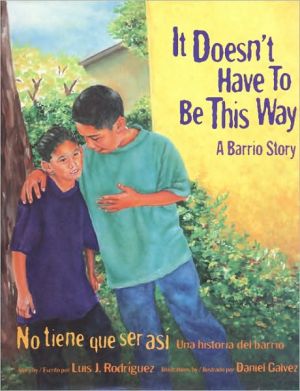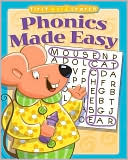It Doesn't Have to Be This Way: A Barrio Story/No Tiene Que Ser Asi: Una Historia del Barrio
Reluctantly a young boy becomes more and more involved in the activities of a local gang, until a tragic event involving his cousin forces him to make a choice about the course of his life. By the author of "Always Running: La Vida Loca, Gang Days in L.A., " winner of the "Chicago Sun-Times" Book Award and the Carl Sandburg Literary Award and a "New York Times" Notable Book. Photos, illustrations.\ \ Reluctantly a young boy becomes more and more involved in the...
Search in google:
Monchi likes to write poems, hang out with his cousin, and tell stories to his uncle. Then one day, a member of the local gang tells him it's time to join up. Monchi is scared but excited. The older boys give him the handshake, girls talk to him, and even teachers are afraid of him. But when a tragic event changes everything, Monchi must make an important decision. There is no easy answer to his dilemma, but the love and respect of his uncle help him find a way out. Written in both English and Spanish, It Doesn't Have to Be This Way is a compelling tale of a young boy's encounter with the world of gangs.Publishers WeeklyMonchi, the 10-year-old narrator of Rodr guez's (Am rica Is Her Name) well-intentioned if oversimplified cautionary tale, describes his encounter with a gang. When Clever, Monchi's neighbor and a gang member, announces, "It's about time you joined the Pee Wees," Monchi is gratified that the older boy "wanted to be friends and wasn't going to hurt me." Thus, he accepts the invitation, despite warnings from his older girl cousin, Dreamer: "I used to hang around with Clever and them guys.... I don't like some of the things they do." On the night he is to be "jumped in" (beaten for 60 seconds by fellow gang members) as a rite of initiation, a rival gang shows up with guns and shoots Dreamer, who has come to dissuade her cousin from participating. After Monchi learns that she will live, he decides not to join the gang. Unfortunately, all the episodes in the bilingual story get equal weight (a visit with Monchi's uncle, a conversation with Dreamer about a knife in Monchi's possession, etc.) so that the story never builds to the climax when Dreamer is shot. Similarly, Galvez's portraits are lifelike but fall short of creating tension. For example, in a spread that foreshadows Clever's malevolence, Clever gets lost in the gutter. The message is valuable, but gets muddied in the telling. Eve Bunting's Your Move, illus. by James Ransome, offers a more forceful picture book treatment of the same subject. Ages 6-up. (Aug.) Copyright 1999 Cahners Business Information.
\ Publishers Weekly\ - Publisher's Weekly\ Monchi, the 10-year-old narrator of Rodr guez's (Am rica Is Her Name) well-intentioned if oversimplified cautionary tale, describes his encounter with a gang. When Clever, Monchi's neighbor and a gang member, announces, "It's about time you joined the Pee Wees," Monchi is gratified that the older boy "wanted to be friends and wasn't going to hurt me." Thus, he accepts the invitation, despite warnings from his older girl cousin, Dreamer: "I used to hang around with Clever and them guys.... I don't like some of the things they do." On the night he is to be "jumped in" (beaten for 60 seconds by fellow gang members) as a rite of initiation, a rival gang shows up with guns and shoots Dreamer, who has come to dissuade her cousin from participating. After Monchi learns that she will live, he decides not to join the gang. Unfortunately, all the episodes in the bilingual story get equal weight (a visit with Monchi's uncle, a conversation with Dreamer about a knife in Monchi's possession, etc.) so that the story never builds to the climax when Dreamer is shot. Similarly, Galvez's portraits are lifelike but fall short of creating tension. For example, in a spread that foreshadows Clever's malevolence, Clever gets lost in the gutter. The message is valuable, but gets muddied in the telling. Eve Bunting's Your Move, illus. by James Ransome, offers a more forceful picture book treatment of the same subject. Ages 6-up. (Aug.) Copyright 1999 Cahners Business Information.\ \ \ \ \ Kirkus ReviewsRodriguez's bilingual story of just how easy it is to drift into gang life is snappily delivered in a tempo that makes it real. Monchi, ten, lives in an LA barrio with his mother, has friends and family nearby, and has a good head on his shoulders. When a gang member mentions he ought to be joining the local gang, Monchi relents, happy not to have been beaten to a pulp by the tough guy. His teacher and cousin, Dreamer, soon learn of Monchi's gang activities; they try to give him some advice, and Dreamer gets shot in the course of her efforts. That wises Monchi up fast, as do the words of his uncle: "I know you want to be a man, but you have to decide what kind of man you want to be." It helps, of course, that his uncle is willing to be his mentor (no father is in evidence here), and that his cousin survives, but that doesn't diminish the effectiveness of this story. Rodríguez offers an alternative vision that doesn't preach, but observes. Galvez's realistic artwork makes the story, and its point, plain and accessible. (Picture book. 8-10)\ \








